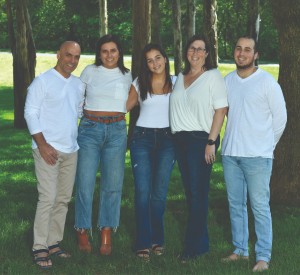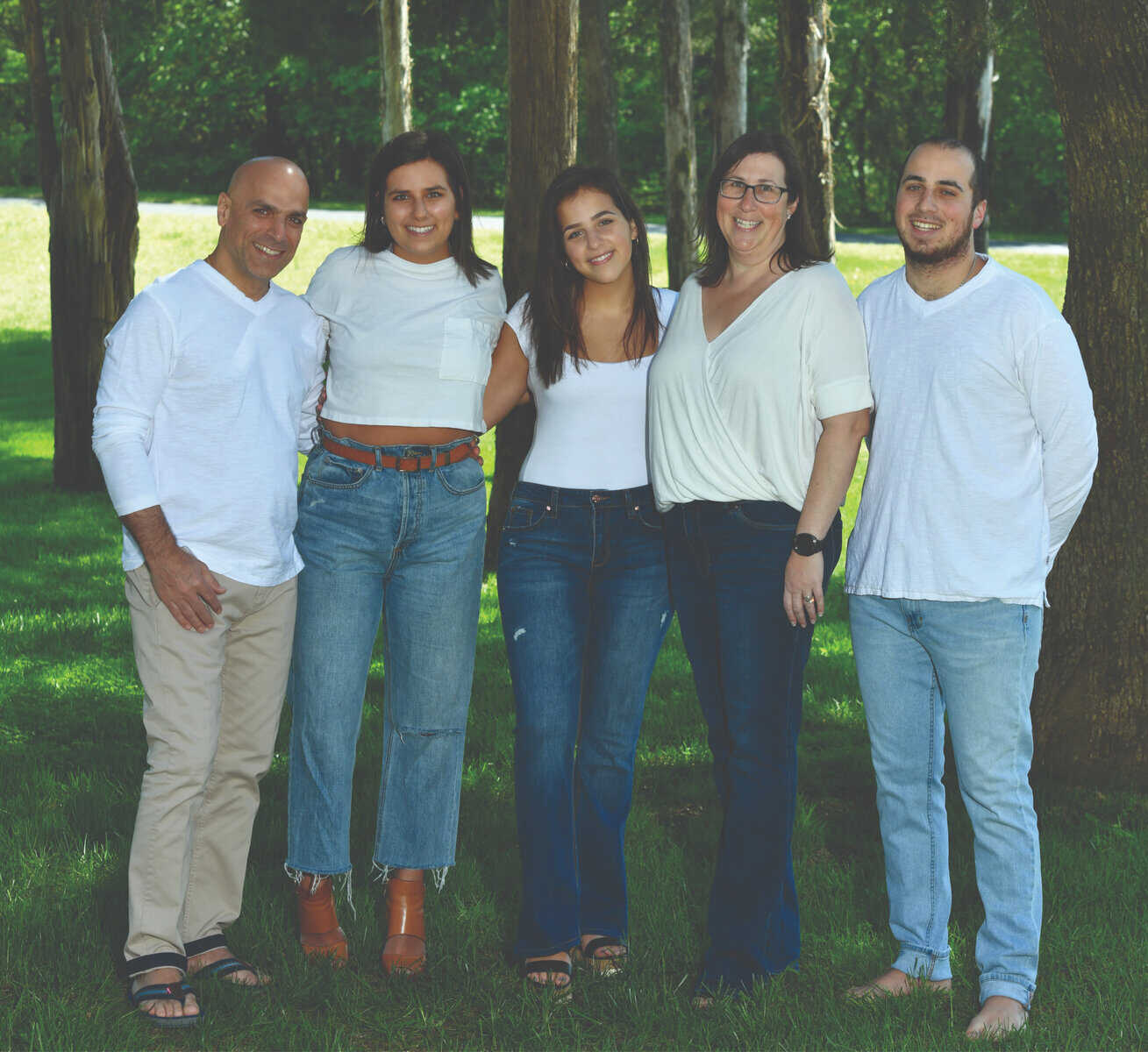 When I was in college, I remember saying to my friends that I did not want to be a mother. It came with responsibility that I did not want. As a mother, you are given a precious gift, yet it comes with no instruction manual and no way to know that you’ll get it right. And, I always wanted to get things right (type “A” here). Three years after that conversation, I was married and gifted my first child. Five years later, we were a family of five. My heart was full and I had learned that there was no right way to raise a child.
When I was in college, I remember saying to my friends that I did not want to be a mother. It came with responsibility that I did not want. As a mother, you are given a precious gift, yet it comes with no instruction manual and no way to know that you’ll get it right. And, I always wanted to get things right (type “A” here). Three years after that conversation, I was married and gifted my first child. Five years later, we were a family of five. My heart was full and I had learned that there was no right way to raise a child.
This precious gift of motherhood comes with awesome power, responsibility, and promise. A legacy to our lives. As a grandchild of four Holocaust survivors, I didn’t have a legacy of cherished items like photos or candlesticks to pass down to my children as reminders of where they came from. Rather, we had more intangible gifts to share between the generations; stories, values, hopes, dreams, and philanthropic aspirations as part of my legacy that I wanted to share with my children. In honor of Mother’s Day and celebrating the influence of women this year, I wanted to talk about creating a shared tradition of philanthropy across generations.
As parents, we can influence, engage, and empower our children specifically around the values of tzedakah and repairing the world. Role-modeling and conversations about giving to charity will affect children as they develop into adulthood. Our children have watched us attend fundraising dinners for organizations we support and watched us when we rolled down our car windows to buy the paper that gives a livelihood to the homeless in our community. They’ve participated in their own giving when we send them to school with their own tzedakah, put coins in the pushka before we light candles for Shabbat, or when they open a B’nai Tzedek Fund at the time of their Bar/Bat Mitzvah.
Parents play an important role in preparing their children to become charitable adults. We should talk and role-model charitable giving with our children throughout their adolescence and share the values from which our philanthropic actions spring. Parents need to ask themselves, “Do my children know that I give to charity? Do they know which charities I give to? Do they know why I give, and why I give to those specific charities?” We can communicate these values purposefully with our children. I have personally found the best time for these conversations was during carpool rides or around the dinner table. Open dialogue, thoughtful conversations, and age-appropriate explanations about giving are helpful strategies for raising charitable children and future leaders in our community.
This is a life-long conversation—it should continue even when our children become adults. My children are now 18, 21, and almost 23; two girls and a boy in the middle. We spend time talking about their charitable interests as well as ours. Sometimes we come to a consensus and sometimes we each have our specific areas we want to impact. Almost always at this point, we agree that we have an ongoing responsibility and commitment of support to the Jewish community where we are and where we hope it will be.
The ongoing intergenerational wealth transfer has deepened interest from parents and scholars alike in understanding more about how the transmission of generosity occurs. For philanthropy, this unprecedented transfer opens up tremendous possibilities. The Jewish community is no different and engaging in these types of conversations with our children in their 20s, 30s, and upwards is critical to ensuring the future of the Jewish community. Right now, there is an unprecedented opportunity to secure the funds necessary for a vibrant Jewish future. Over the next 25 years, a mind-boggling $68 trillion will transfer to the next generation, with $6.3 trillion allocated to charity. We estimate that 20 percent of this allocation, or $1.26 trillion charitable dollars, will be given from Jewish donors.
This is why the Jewish Future Pledge exists and why the Tidewater Jewish Foundation is engaged in the process, partnering with United Jewish Federation of Tidewater and all of our LIFE & LEGACY partners. This will help address the need for these multi-generational conversations to take place and enable us to articulate our own “whys” and engage in the conversation with our adult children to pass on the “giving mantle.” Together we can do our part in our community to help ensure that more than $600 billion is set aside for Jewish causes when wealth is transferred from this generation to the next.
Parental giving matters for the intergenerational transmission of generosity. However, sons and daughters are receiving different messages—or responding to those messages in different ways. Heightened awareness about the gap in charitable giving between sons and daughters suggests opportunities to increase awareness and develop traditions around giving intentionally.
We should engage children in philanthropic practice year-round, not just around the holidays and special occasions like Bar/Bat Mitzvahs or other happy occasions. As my children grew up, watching us as parents give wasn’t enough. The transmission of the philanthropic spirit required a deep-seated connection to influencing the world and supporting causes that not only we, as parents, care about, but also incorporate the values and experiences that our next generation has grown to care about as well. Incorporating discussion about caring for and helping others at family meals and gatherings, reading books that illustrate philanthropic values and describing our charitable activities, and why we are involved, are purposeful and deliberate strategies to ensure that the transmission of values occurs from one generation to the next.
But whose values and whose charities are questions that can disrupt family harmony. These questions can be difficult and do not happen organically, particularly when multiple generations are involved. Families can make choices with their philanthropic resources; they may allocate a portion of the funds for each member’s interests, or they may create a family philanthropic mission statement that is broad enough to encompass them all. Parents may choose to endow specific areas of interest and then pass philanthropic resources to the next generation for them to make their own decisions. This is the avenue we have chosen for our family. I have endowed my gift to the Federation Annual Campaign, made legacy gifts to organizations I care about, and am setting up donor-advised funds for my children through the Bnai Tzedek program. We at TJF can help facilitate these conversations around family philanthropic planning. For families, philanthropy can serve as the tie that binds. Transmitting the “generosity gene” from one generation to the next is the first stepping-stone to creating a strong foundation for the continuity of family giving and volunteering.
Intentionality and open communication are key to the intergenerational transmission of generosity. Think about how you share your passion for giving with your children and grandchildren. Do you talk about your giving and volunteering candidly? Do you explain why caring for others is important to you?
Here are a few starter questions on how to open a dialogue with family members about philanthropy:
• How did you learn about philanthropy?
• Who were your role models?
• What are the traditions you had in your family around giving and volunteering when you were growing up? What traditions have you instituted in your own family?
• What do you value, and how do you apply those values in your philanthropy?
• How can we as a family make a difference in our community and the world? What causes can we support together to effect that change?
Advisors at Tidewater Jewish Foundation are available to help facilitate discussions on topics such as what causes you are passionate about, what charities you want to support, or more importantly, what impact you want to make and what legacy you want to leave for future generations. I hope I get the chance to engage in these meaningful conversations with your family just as I have with my own. Our future is depending on it. I look forward to getting to know members of this community better. Do not hesitate to reach out.
Naomi Limor Sedek is Tidewater Jewish Foundation’s president and CEO. She may be reached at nsedek@ujft.
– Naomi Limor Sedek

